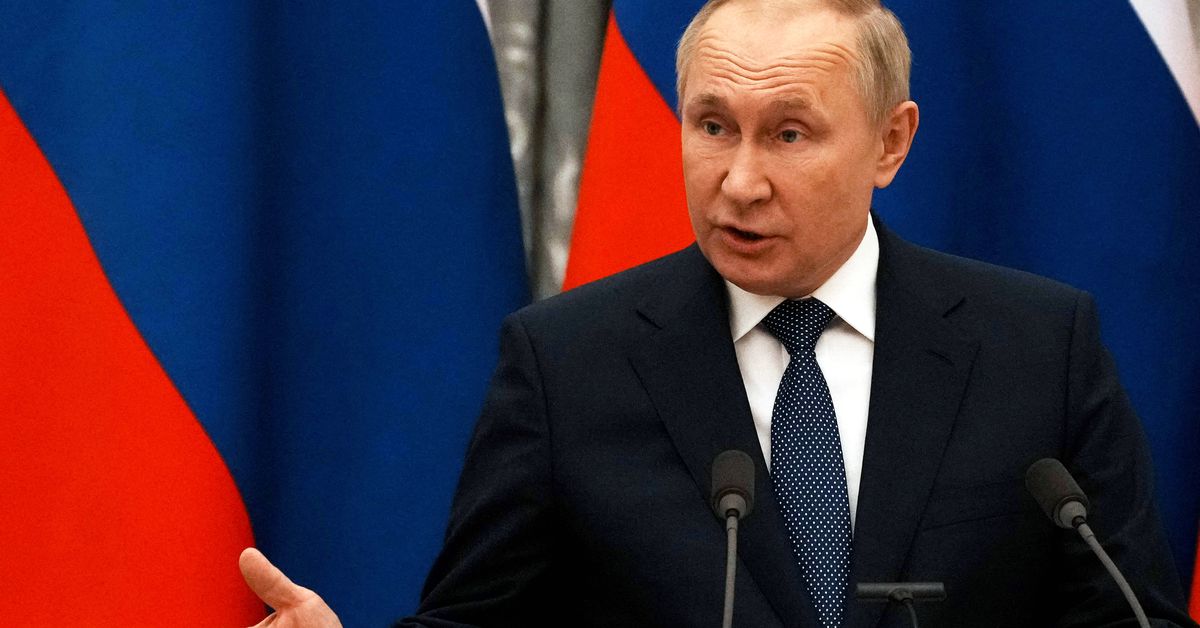[ad_1]
The United States has threatened to sanction Russia if it invades Ukraine.
But, what, exactly those sanctions might look like — and how punishing they might be — will depend not just on what Russia does, but on the costs the United States and its allies, especially in Europe, are prepared to withstand.
This is the dilemma facing the United States, which has ruled out deploying forces to Ukraine. The most aggressive sanctions, like making it extraordinarily difficult for Russian financial institutions and state-owned banks to trade in US dollars, could inflict a lot of hurt on Russia, and very likely, its people, if the sanctions sparked inflation or other economic crises. Other dramatic options exist, like blocking Russia’s biggest exports, oil and gas.
But the more far-reaching and destructive to the Kremlin, the more potent the potential reverberations in the West. The most severe sanctions, like cutting off Russia from all or parts of the global financial system, may hurt other economies intertwined with it. The US and Europe are not exempt. Russia may take counter or retaliatory measures, too. The most feared scenario would be Russia cutting off natural gas supplies to Europe, in the middle of winter, when gas prices are already spiking.
“The problem is where it hurts the most — for example, to cut the import of Russian gas or oil — that fires back on the EU and the US,” said Maria Shagina, a visiting fellow at the Finnish Institute of International Affairs.
These calculations are not new. The United States and its allies made similar ones in 2014, after Russia annexed Crimea and invaded eastern Ukraine. The United States and Europe placed targeted sanctions on Russia, including on certain individuals close to the Kremlin, and within certain sectors, like financial and defense. But they did not take the most dramatic steps — like really going after Russia’s energy sector, or going after the biggest financial institutions — because of what it might unleash.
Now the US and its partners are again staring down this question: How to punish Putin, without punishing themselves, at least too much. Russia has also taken steps to help insulate its economy from future sanctions, but it does not, experts said, make Moscow immune. The West has options, powerful ones.
Right now, among some of the toughest measures reportedly being finalized by the US are financial sanctions that could target key Russian banks and institutions, and export bans on certain technologies. Sanctions on oligarchs and others in Putin’s circle are also likely, along with other targeted measures. The US Congress is also trying to hammer out a deal on a sanctions package, one that might sanction Russia for destabilizing activities now, and would trigger tougher ones if Russia invaded, including on Nord Stream 2, the Russian gas pipeline that even the EU has said might be killed if Russia moves into Ukraine.
Exactly where NATO allies and other European countries stand on these measures is less clear; a lot of these discussions are happening as quietly as possible to avoid any disagreements spilling out into the open and spoiling efforts at Western unity.
“What’s the least bad alternative?” said Nigel Gould-Davies, senior fellow for Russia and Eurasia at the International Institute for Strategic Studies. “There’s no costless way to try to deal with the threat of Russian aggression.”
Sanctions: The good, the bad, and the backfiring
What sanctions might mean for Russia depends on the size, scale, and scope of any imposed. But figuring out what those economic penalties should look like is complex.
“The problem of Western policymakers is that Russia is just too big an animal in the global economy,” said Alexander Gabuev, senior fellow and chair of the Russia in the Asia-Pacific Program at the Carnegie Moscow Center.
:no_upscale()/cdn.vox-cdn.com/uploads/chorus_asset/file/23224784/GettyImages_1369208455.jpg)
The severest sanctions against Russia could echo across the global economic system, which is already dealing with inflation and other pandemic-related hangovers. This is especially true when it comes to Russia’s export of raw materials and hydrocarbons — like oil and gas. Europe is reliant on Russia for about a third of its natural gas, and with fuel prices spiking and the continent already feeling an energy crunch (which some believe Russia has been happy to let happen), it is wary of even greater disruptions. And while the United States has other options, it still imports billions of dollars in Russian oil.
This reality makes it much harder to take seriously some of the “nuclear option” approaches — like cutting Russia off from SWIFT, the electronic messaging service that allows entities to communicate about global financial transactions — even if everything is still theoretically on the table. This also makes something like broad sanctions on Russia’s energy sector improbable. “If you really wanted to punish the Russian economy, that’s what you would do,” said Rodney Ludema, an international trade expert at Georgetown University. “Nobody has the appetite for doing that, at least not in Europe. And that’s really going to be the big political fault line.”
Experts did say there were more surgical ways to go after Russia’s energy sector, building upon the 2014 sanctions, particularly when it comes to future projects. There is also the Nord Stream 2 pipeline, which is awaiting approval and would bring Russian gas directly to Germany. Both the US and Germany have said the project is in jeopardy if Russia invades.
But short of those things, the US has options to impose the most devastating penalties yet levied against the Kremlin. Right now, the Biden administration is reportedly considering financial sanctions against Russia’s largest banks, and export controls on technology and other components that might target Russia’s critical industries. These options could inflict real pain on Russia — but could have unintended consequences for Russia, the US, and Europe.
Take the former option: “If you’re forbidden by sanctions from trading dollars, then life is very hard for you because you’re cut off from the global financial system,” Gould-Davies said. This is not quite Iran-level “maximum pressure” sanctions, but the power of the US dollar is such that it makes it very hard for any targeted Russian banks to find workarounds, as the rest of the world’s banks and institutions don’t want to take the risk of running afoul of US sanctions.
The harsher these sanctions are — that is, if the US targets some of Russia’s major banks — there is the potential that such damage could trickle down to ordinary Russians. “It would certainly result, I think, in the living standards of Russians being affected,” said Richard Connolly, lecturer in political economy at the Centre for Russian and East European Studies at the University of Birmingham. “It would cause a lot of disruption.”
This could generate discontent within the broader Russian public, putting pressure on Putin’s regime. But historically, even if you’re playing the very long game, that hasn’t tended to work out the way the US hopes. And it seems a lot less likely than Putin trying to use this as a rallying cry against the West.
Another option the Biden administration is considering is an export ban on components for high-tech products — things like microchips or semiconductors, especially those targeting critical industries. This would effectively bar any company from sending Russia a product if it has US-designed or licensed components in it, cutting the Kremlin off from a critical supply chain. This is what the US used, to pretty strong effect, against Huawei.
Jeffrey Schott, senior fellow at the Peterson Institute for International Economics, said some of the biggest questions are still around what an export ban on technological components might look like. “How extensive would the coverage of the controls be? Would it be particular companies? Would it be whole sectors of the economy?” he said. The broader the ban, the more countries you’d need to get in line — not just Europe, but likely partners in Asia, too. And China is a big wild card, as Beijing seems unlikely to go along with the West’s efforts to punish Moscow.
But even China doesn’t fully have the ability to make up for all the kinds of technologies Russia might need. And that would leave Russia without many options, and it could, over time, squeeze sectors like defense and cyber operations, the very things Russia wields to sow chaos.
:no_upscale()/cdn.vox-cdn.com/uploads/chorus_asset/file/23224818/GettyImages_1369164228.jpg)
Another likely target for sanctions are the people within or close to Putin’s inner circle, or top officials. This would add to the hundreds and hundreds of sanctions the US and Europe have placed on Russian individuals since 2014. The US has also raised the possibility of sanctioning Putin himself, an extraordinarily provocative move.
Individual sanctions could include things like travel bans, or freezing assets outside of Russia. In response, the theory goes, these powerful people might pressure Putin to change his ways, or even try to push him out.
Except that didn’t really happen after 2014, and it’s unlikely this time would be any different. This is largely because sanctioning oligarchs forces them to make a choice. “Either you stay in Russia, and throw your luck with the regime, or you try to sell most of your assets in Russia and diversify and basically move out,” Gabuev said.
And for the oligarchs who choose the regime, sanctions can have the unintended side effect of making them more dependent on Putin. Because if they can’t do business or park their assets in the West, then they need the regime to prop up their profits. “If they’re close to the leadership, they’ll find a way of circling the wagons,” said Connolly, of the University of Birmingham. “And then if they’re not, you’re not really having much of an impact.”
How much can Russia withstand — and how will it react to it?
Putin has been preparing for the likelihood of more sanctions since 2014. The penalties after that Ukraine invasion, and then for other things — from human-rights violations to election meddling — took a toll. Putin has responded by trying to insulate Russia from the harshest effects of whatever sanctions the West comes up with next.
Putin has tried to move away from the dollar, both in how Russia trades and as the currency for its assets, shifting to euros or the yuan. In the meantime, he has built up massive cash reserves to the tune of $630 billion, which means he can offset some of the financial pain. Russia has decreased the amount of debt held by foreigners, something the US has targeted before. The Kremlin also has pursued a conservative fiscal policy in an effort to keep debt low and be able to weather possible sanctions. “I call it a ‘Kalashnikov economy’,” Connolly said. “And by that I mean that it’s durable.”
But durable isn’t impenetrable. The West’s financial hegemony, especially, makes that impossible.
“The worst is not sanctions, per se, but a limited ability of Russian businesses to do global business,” said Konstantin Kroll, a partner and the head of Russian corporate and M&A practice at international law firm Dentons. “Because there is much less trust. It’s harder to access international capital markets. Many international counterparts have worries about potential US sanctions, and therefore, Russia is becoming more isolated.”
And, of course, if the West really amps up the pressure on Russia, there is always the risk it will respond in kind. “Russia will almost surely consider counter-sanctioning as they’ve done in 2014, and there, Europe has much more vulnerability relative to the US,” said Daniel Ahn, former chief economist at the US State Department from 2014 to 2018.
Russia also has the ability to create chaos. It could launch cyber operations or disinformation campaigns. It could cut off the Russian energy supply to Europe. And those legitimate fears are likely to shape the response from the West.
:no_upscale()/cdn.vox-cdn.com/uploads/chorus_asset/file/23224847/GettyImages_1238273755.jpg)
Sanctions are a serious step, but may not be enough
The sanctions the US and Europe have imposed over the last eight years have caused economic pain for Russia. But Russia’s military buildup along the Ukrainian border is a fairly big indicator they haven’t halted Russia’s aggression.
Even the the threat of “devastating” sanctions is unlikely to deter Russia, if it really wants to invade. “If you’re talking about a country that has already done something that’s deserving of sanctions, it’s probably because they knew that sanctions was a possibility, and they didn’t care,” Ludema said.
Sanctions, too, “are rarely a light switch,” as Gould-Davies put it. They can take time, especially when you’re dealing with a large and resilient adversary, which Russia is.
And yet, sanctions are the primary tool that the US and Europe has to work with.
According to the New York Times, the administration has held about 180 consultations with European partners since November — a sign, at least, that the White House is valuing unity and coherence in the response. The US is also working with other countries, including those in the Middle East, to try to divert gas supplies if Russia retaliates, though energy interdependence between Europe and Russia likely can’t be unraveled by the time of a Russian invasion.
This will mean trade-offs, exceptions, special carve-outs; anything to try to lessen the collateral damage. “To find this magic solution where you don’t lose, but Russia loses, is very hard,” Shagina said.
[ad_2]
Source link



















